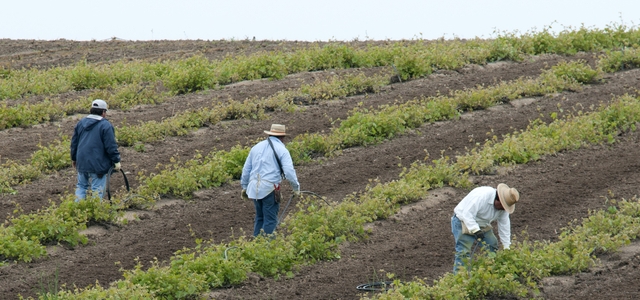 Approximately 11 million undocumented immigrants could become eligible for legal status under S. 744, the immigration reform bill the Senate is considering, including millions of undocumented farmworkers. The importance of finding a way to create a legal workforce within the agriculture industry is critical, as undocumented farmworkers make up an estimated 53 percent of agriculture workers.The benefits of legalization for farmworkers are numerous, if history is our guide. There are many differences and improvements in the 2013 immigration bill compared to earlier reform measures, but the 1986 Immigration Control and Reform Act (IRCA) offers some examples of the benefits legalization provides for undocumented farmworkers. As Paulino Mejia, who crossed the border illegally from Mexico in 1980, told the Associated Press, gaining legal status from IRCA let him settle in California and invest in his family’s future. “Immigration reform changed my life. It gave my family freedom,” he said. “It allowed us to reach the American dream.” While Mejia’s wife continues to pick crops, he said being a legal worker let him move on to better jobs so he could provide for his family.
Approximately 11 million undocumented immigrants could become eligible for legal status under S. 744, the immigration reform bill the Senate is considering, including millions of undocumented farmworkers. The importance of finding a way to create a legal workforce within the agriculture industry is critical, as undocumented farmworkers make up an estimated 53 percent of agriculture workers.The benefits of legalization for farmworkers are numerous, if history is our guide. There are many differences and improvements in the 2013 immigration bill compared to earlier reform measures, but the 1986 Immigration Control and Reform Act (IRCA) offers some examples of the benefits legalization provides for undocumented farmworkers. As Paulino Mejia, who crossed the border illegally from Mexico in 1980, told the Associated Press, gaining legal status from IRCA let him settle in California and invest in his family’s future. “Immigration reform changed my life. It gave my family freedom,” he said. “It allowed us to reach the American dream.” While Mejia’s wife continues to pick crops, he said being a legal worker let him move on to better jobs so he could provide for his family.
Growers know they could lose skilled immigrant workers to higher-paying jobs if they can apply for citizenship. “We support the pathway to citizenship at our own peril, knowing we will lose the people who are most skilled and most productive employees within a short time,” Tom Nassif, president of Western Growers, told the AP. But that exodus to non-agricultural jobs might not be as fast as 1986 because of significant changes in the current bill. To qualify for the expedited legalization process, farmworkers would have to remain in the agriculture industry for at least five years. The Senate bill also addresses future legal immigration by setting up a workable guest worker program so that farmers can bring in needed workers. This is a version of the AgJOBS proposal, an overhaul of the agriculture temporary worker program that lawmakers have discussed for more than a decade. In April, Sen. Dianne Feinstein (D-CA) helped to negotiate the agreement between agricultural workers and growers that was attached to the Senate’s immigration bill.
And as the debate about immigration reform continues, farmers are watching closely because they cannot fill open positions and need skilled immigrant agricultural workers to harvest crops. In Colorado, growers are pushing for immigration reform because they are losing thousands of dollars without enough workers as squash and peppers rot in the fields. The Senate immigration bill aims to create an immigration system that is built to last by legalizing those who are already here, clearing out the backlogs of immigrants waiting to enter the U.S., and addressing future legal immigration by those who want to work here. The combination of having a way to legalize undocumented farmworkers and establishing a legal immigration system to bring in future workers should help farmers to have the legal employees they need while allowing current undocumented workers to improve their lives.
FILED UNDER: immigration legislation, immigration reform, Senate, Visas


